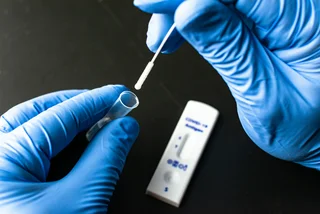The Czech Ministry of Health has reported a significant surge in Covid-19 infections, with almost 1,000 new cases (many of which are the Omicron XBB.1.5 variant) added on Wednesday alone. This worrying trend comes as the number of patients in hospitals has surpassed 500, raising questions about the current state of the pandemic.
Because Covid-19 often presents as the flu or other respiratory illnesses, it’s important to see your doctor if you are experiencing symptoms.
Here’s the latest on new variants, testing, vaccines, and the rules for isolating in the Czech Republic.
New variants in Czechia
The Omicron XBB.1.5 variant currently prevails in the Czech Republic and is also the target of modified Covid vaccines from Pfizer and BioNTech, approved by the European Commission on Sept. 1.
However, according to the director of the Institute of Health Information and Statistics (ÚZIS) the EG.5.1 and FL.5.1 variants are gaining prominence. Both variants are descendants of XBB.1.5 (Centaur), XBB.1.16 (Arcturus), and XBB.1.19 variants.
The new and closely monitored variant is BA.2.86, which has evolved from BA.2 and exhibits a high number of mutations. However, BA.2.86's infectivity may be considerably lower than that of XBB.1.5 and EG.5.
Updated testing protocols
Two years ago at the height of the pandemic, free testing sites were readily available. These days, Covid testing stations are more difficult to come by; a list of places offering PCR testing is available here.
At this time, public health insurance pays only for diagnostic tests issued by your physician.
At-home Covid tests, however, can be purchased in Czechia at brick-and-mortar or online pharmacies to help identify the virus and differentiate it from other respiratory illnesses.
Home testing kits detect the presence of antigens, a distinctive protein of the SARS-CoV-2 virus. Antigen tests provide rapid results within minutes, and they are available in two forms: a nasal swab or a lollipop test. Gargle tests require you to collect a sample by gargling in your mouth and throat, with the results being delivered by medical professionals within 24 hours based on laboratory PCR tests.
The price of these tests varies, with antigen tests costing between CZK 46 and 100 per test, while more accurate PCR tests are priced at CZK 864.
Anti-covid measures in 2023
No anti-epidemic measures or the re-introduction of isolation and quarantine for infected individuals are currently scheduled.
According to figures from the Health Ministry, on Monday, Sept. 4, Czechia registered a total 199 new Covid-19 cases. Less than two months later – on Monday, Oct. 30 – this figure reached 1,525. In terms of hospitalizations, this number was at 32 in early September and over 500 in late October.
"The system is in place, and we do not anticipate any additional changes or measures. We believe that further planning is unnecessary," stated Health Minister Vlastimil Válek in September.
Even if you receive a positive test result, isolation is not mandatory for the general population. Isolation measures are primarily required for individuals working in healthcare or social services who could potentially infect high-risk patients.
If you’ve been in contact with an infected person, you are no longer required to go into quarantine or isolation. However, the Health Ministry continues to encourage responsible behavior – avoiding crowded places, limiting social interactions, and refraining from using public transport.
Which vaccinations are available in Czechia?
Doctors advise an annual Covid-19 booster shot, particularly for high-risk groups like seniors, immunocompromised individuals, and those with chronic conditions.
Covid-19 vaccinations available in the Czech Republic
- Comirnaty Omicron XBB.1.5. by Pfizer and BioNTech: This mRNA-based vaccine targets current coronavirus variants. Distribution began on September 12, 2023, and medical facilities, general practitioners, and vaccination sites can easily order it without registration.
- Novavax's Nuvaxovid: Produced in the Czech Republic, this vaccine, based on proteins, is awaiting approval in the coming fall. It can be administered as a primary series for individuals aged 12 and older and as a booster for adults.
- Moderna's Spikewax: A non-live mRNA vaccine designed to protect individuals aged six and older against Covid-19.
- Jcovden by Janssen: This viral carrier-based vaccine is intended for Covid-19 prevention in individuals aged 18 and older.
- Vaxzevria by AstraZeneca: Another viral carrier-based vaccine for Covid-19 prevention, recommended for those aged 18 and older.
A monovalent vaccine targeting the emerging XBB.1.5 variant is available to all and is covered by insurance. Covid and flu vaccines can be administered together or with a two-week interval for safety.
Válek recently encouraged the public to wear a mask (or respirator) if they are experiencing flu or Covid-19-like symptoms to minimize the risk of spreading the illness. The Health Ministry also issued a strong reminder that people’s immune systems widely differ and emphasized the importance of being mindful of this.












 Reading time: 3 minutes
Reading time: 3 minutes 
































